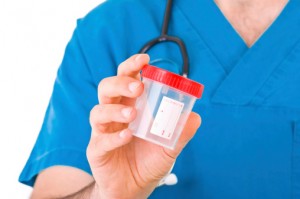I remember the first time a supervising physician suggested that I order a drug test before prescribing a controlled medicine to one of my primary care patients. I felt queasy. I started to sweat. I thought, “Did you say drug test? Seriously? I’m no cop!” I worried that my patient would be offended.
A decade later, I frequently order urine drug tests for my patients. Further, I regularly teach primary care doctors and trainees around the country to order urine drug tests for their patients. I encourage them to do it, and to do it more often. Why? Have I become a cop? Let me tell you about another first in my development as a physician.
 The Responsibility of Prescribing Drugs
The Responsibility of Prescribing Drugs
I distinctly recall the terror I felt as a new physician the first time I prescribed a medication. What if the patient is allergic? What if the dose is too high? What about drug-drug interactions? What if the patient takes it with grapefruit juice?
Physicians need to consider the risks of medications we prescribe. We are asking other humans to put potentially toxic substances into their bodies. We could be responsible for resulting sickness or even death. Thus, it is a physician’s charge to use caution, prescribe medication judiciously and do what he or she can to ensure that the medications prescribed are used as safely as possible.
Why Controlled Substances Pose More Risk
This is true for all medications, but it’s particularly true for controlled substances, including opioid analgesics such as oxycodone and morphine. For the most part, controlled substances are controlled because of their risks. And, unlike taking other risky medications such as insulin or warfarin (which also can kill you), using these substances is rewarding and reinforcing. They make you feel good, and humans can be tempted or compelled to use them, and to use more of them. Your body can become dependent upon them, and you may get sick if you stop them suddenly. So the physician’s responsibility to use caution is heightened. It also means that some patients’ drive to get a prescription from a physician might override their instincts to be open and honest with the physician who prescribes them.
The focus of my research and teaching at Albert Einstein College of Medicine and my clinical work at Montefiore Medical Center is treating patients with chronic pain who are, or have been, prescribed opioid analgesics such as oxycodone or morphine. I order urine drug tests for all patients who have been prescribed opioids because I need to collect whatever data I can to help me understand how safe the medications that I prescribe are for my patients. I also consider safety to the public. If medications that I prescribe to my patients are instead ingested by others (by any means—sharing, selling, loss or theft), then others can be harmed. I order drug testing for all my patients, because everyone is at risk, and because I don’t want to single out or offend my patients.
Sometimes, a drug test is positive for substances, such as heroin or other opioids obtained from friends, family or on the street, that were not prescribed but could be dangerous when combined with a prescribed medication. If my patient is taking other opioids, he or she is at risk for overdose or death. Usually, the test is positive for the medication that I prescribed and it reassures me that the patient is taking it.
Imperfect But Still Useful
Critically, urine drug tests, like most lab tests, are imperfect. The standard tests we use can give false positive or false negative results. The confirmatory tests can be complicated to interpret because once ingested, a substance can metabolize, or break down, into a different one. Individuals metabolize substances at different rates. Samples can even be lost or mislabeled, and machines can malfunction. Thus, physicians need to understand the limitations of urine drug testing and be mindful not to jump to conclusions that could jeopardize their relationships with patients or their patients’ well-being.
Physicians don’t want to be police; our mission is not to find perpetrators of illegal or dangerous activity. Our mission is to understand and weigh the risks and benefits of treatments we provide. Urine drug test results give me data to help me weigh the risks. I can’t prescribe warfarin without understanding a patient’s risk for having a life-threatening bleed from a fall or an ulcer. And I can’t prescribe oxycodone without understanding a patient’s risk for overdose. To me, this feels like being on the patient’s side.

